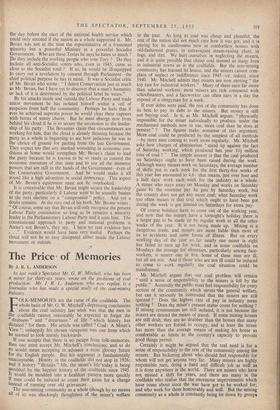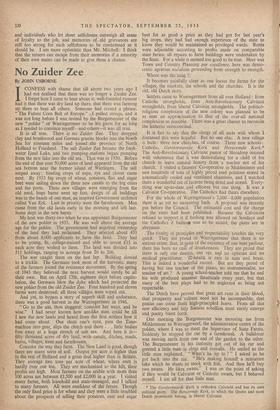The Price. of Memories
In last week's Spectator Mr. G. W. Mitchell, who has been a miner for thirty-six years, wrote on the problems of coal production. Mr. J. R. L. Anderson, who now replies, is a journalist who has, made a special study of the coal-mining Industry. .
FOLK-MEMORIES are the curse of the coalfields. The whole basis of Mr. G. W. Mitchell's depressing conclusions about the coal industry last week was that the men in the coalfields cannot reasonably be expected to forget the " drabness " and " dreariness " of life ' which history has dictated" for them. His article was called " Coal: A Miner's View "; unhappily his chosen viewpoint was one from which he seemed' to look mainly backwards. If one accepts that there is no escape from folk-memories, then one must accept Mr. Mitchell's conclusions; and to do 80 would mean accepting in advance a most gloomy future for the English people.. But his argument is fundamentally unacceptable. History in the coalfields did not stop in 1926; and if history " dictates " life, the miner's life today is being Moulded by the happier history of the coalfields since 1945. It would be moulded into a healthier pattern more quickly if men could be induced to count their gains for a change instead of running over old grievances. The non-mining community as a whole (though by no means all of it) was shockingly thoughtless of the miner's welfare in the past. As long as coal was cheap and plentiful, the rest of the nation did not much care how it was got; and it is paying for its carelessness now in comfortless houses with old-fashioned grates, in extravagant steam-raiding plant, in fogs, and dirt. We hurt .ourselves in neglecting the miners, and it is quite possible that cheap coal stunted as many lives in industrial towns as in the coalfields. But the non-mining community has learned its lesson, and the miners, cannot com- plain of neglect or indifference since 1945—or, indeed, since 1940. Mr. Mitchell admits that miners are now earning " the top rate for industrial workers." Many of them earn far more than salaried workers; most miners are rich compared with schoolmasters, and a faceworker can often earn in a day the stipend of a clergyman for a week.
If ever debts were paid, the rest of the community has done its best to pay its debt to the miners. But money is still not buying coal. Is it, as Mr. Mitchell argues, " physically impossible for the, miner individually to produce, under the mechanised methods now in use, more coal than he does at present " '? The figures make nonsense of this argument.
More coal could be produced by the simplest of all methods —by more men coming to work more regularly. Mr. Mitchell asks how charges of absenteeism " stand up against the fact of Saturday working, which produced last year 10 million tons of coal ? " The simple answer is that the coal produced on Saturdays ought to have been raised during the week.
Although many miners work on Saturdays, the average number of shifts put in each week for the first thirty-five weeks of this year has amounted to 4.6—that means, just over four and a half days' work each week for the industry as a whole. ..A miner who stays away on Monday and works on Saturday gains by the overtime pay he gets by Saturday work, but the country does not get any more coal; what Saturday work too often means is that coal which ought to have been got during the week is got instead. on Saturdays for extra pay.
Of course holidays have to come out of the working year, and now that the miners have a fortnight's holiday there is a larger gap to be made up by regular work in all the other weeks of the year. It is not being made up. Mining is a dangerous trade, and miners are more- liable than most of us to accidents and some forms of illness. But on every working day of the year so.far nearly one miner in eight has failed to turn up for work, and in some coalfields on Mondays the average for absentees, particularly among face- workers, is nearer one in five. Some of these men are ill, but all are not. And if those who are not ill could be induced to come to work regularly the coal situation could be transformed.
Mr. Mitchell argues that our coal problem will remain " until a sense of responsibility to the miners is felt by the public." Assuredly the public must feel responsibility for every section of the community which serves-the general welfare, but can it seriously be contended that the miners are still ignored ? Does the highest rate of pay in industry mean nothing ? Does the miner's present status count for nothing ? If mining communities are still isolated, it is not because the miners are denied the means of travel. If some mining houses are still drab, they are no drabber than the homes that many other workers are forced to occupy, and at least the miner has more than the average means of making his home as comfortable as limits to the country's capacity to provide good things permit.
Certainly it might be argued that the real need is for a sense of responsibility to the rest of 'the community among the miners. But bickering about who should feel responsible for whom will not get anyone very far. Many miners are highly, responsible men, doing a hard and difficult job as well as it is done anywhere in the world. There are miners who have not missed a shift for years, and there are many in the coalfields who realise that the enormous improvements which have come about since the war have got to be worked for; and who work for them honourably and well. But the mining community as a whole is constantly being let down by groups and individuals who let sheer selfishness outweigh all sense of loyalty to the job, and memories of old grievances are still too strong for such selfishness to be condemned as it should be. I am more optimistic than Mr. Mitchell : I think that the miners can escape from their memories if a minority of their own mates can be made to give them a chance.



































 Previous page
Previous page